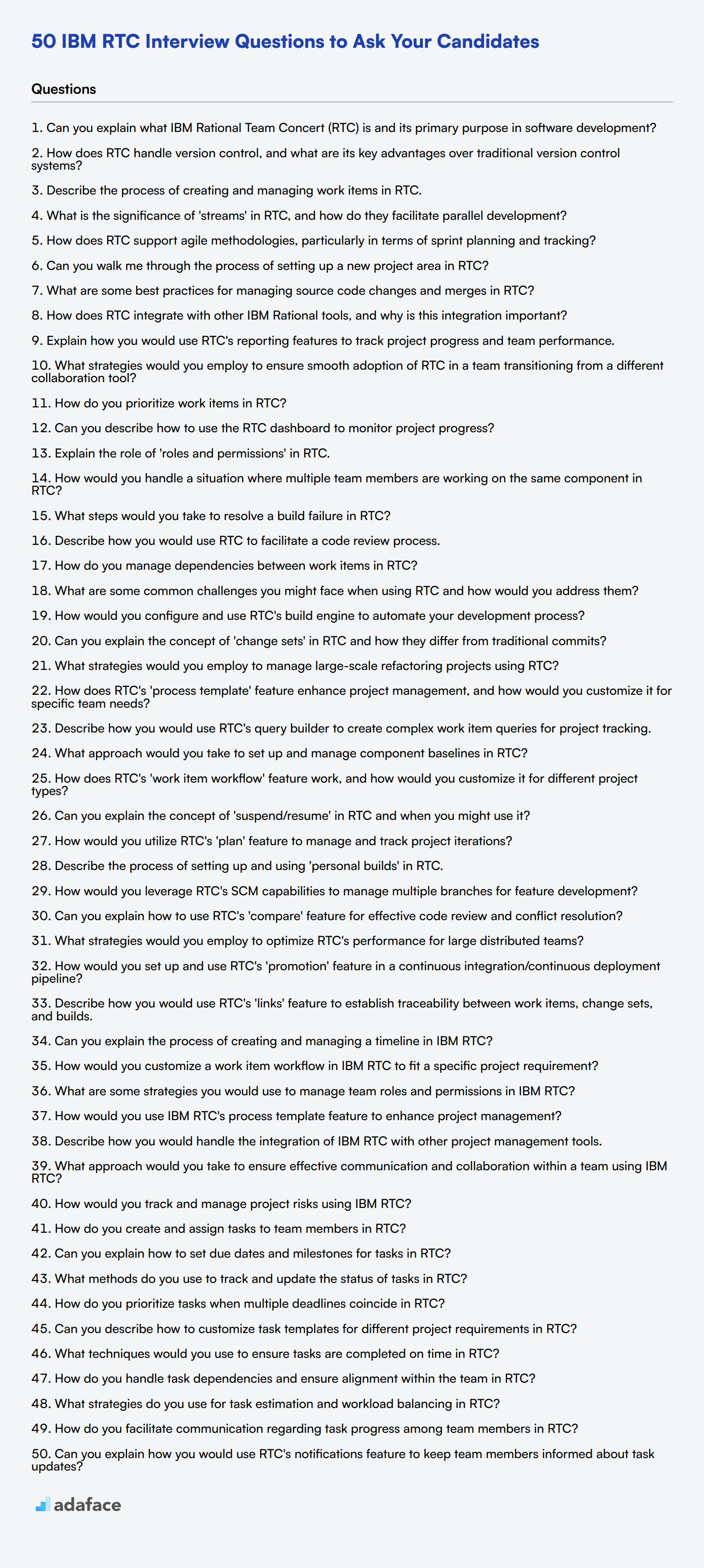Hiring the right IBM Rational Team Concert (RTC) professionals is crucial for successful project management and collaboration. By asking targeted interview questions, recruiters and hiring managers can assess candidates' software engineering skills and their proficiency with RTC tools and processes.
This blog post provides a comprehensive list of IBM RTC interview questions tailored for different experience levels and job roles. We cover common questions, junior and mid-tier analyst evaluations, process-related inquiries, and task-specific queries.
Use these questions to gain deeper insights into candidates' RTC expertise and make informed hiring decisions. Consider combining these interview questions with pre-employment assessments to thoroughly evaluate candidates' technical skills before the interview stage.
Table of contents
10 common IBM RTC interview questions to ask your candidates
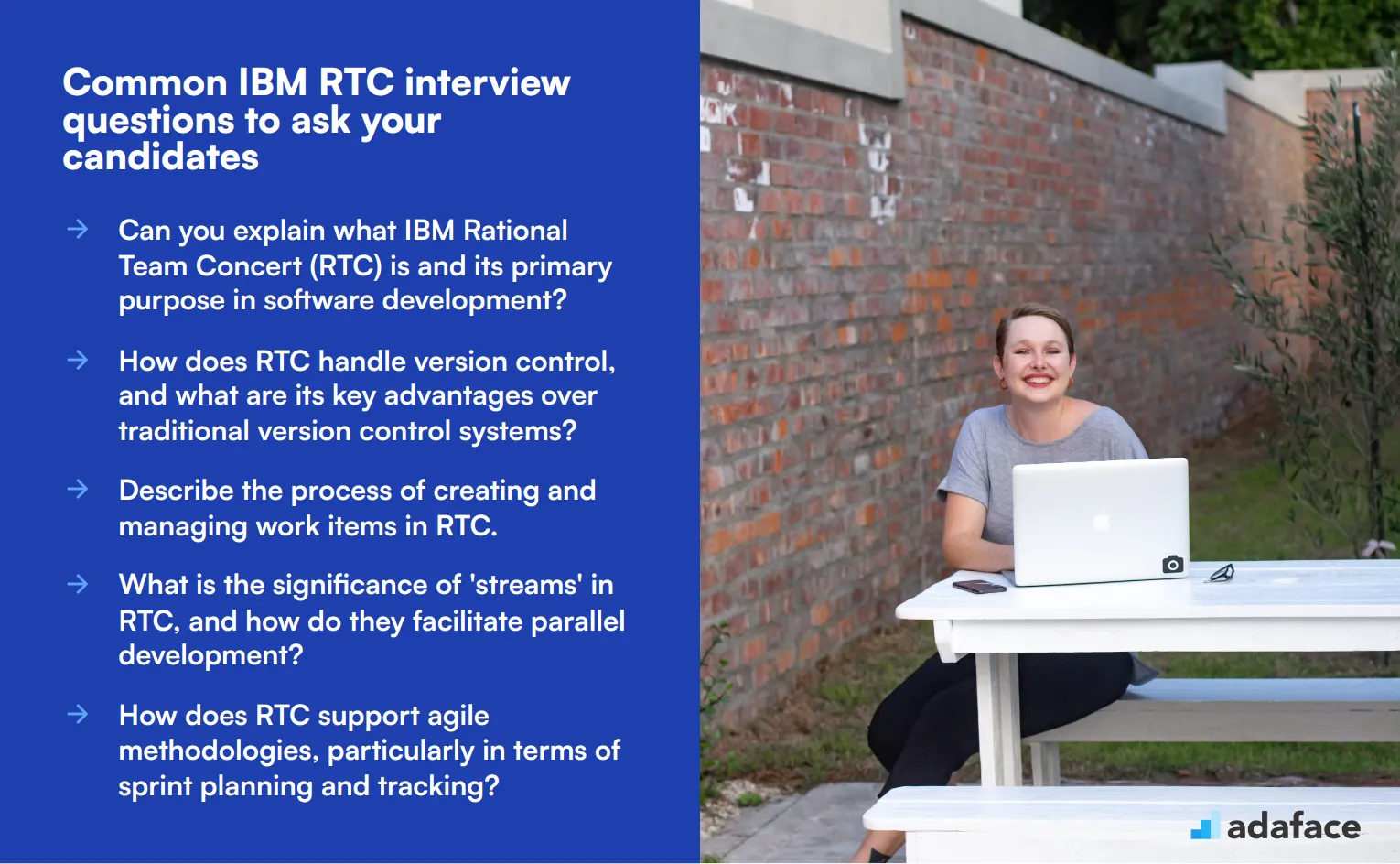
To effectively evaluate candidates for IBM RTC roles, use these 10 common interview questions. They will help you assess a candidate's understanding of RTC's core features, workflows, and best practices in software development collaboration.
- Can you explain what IBM Rational Team Concert (RTC) is and its primary purpose in software development?
- How does RTC handle version control, and what are its key advantages over traditional version control systems?
- Describe the process of creating and managing work items in RTC.
- What is the significance of 'streams' in RTC, and how do they facilitate parallel development?
- How does RTC support agile methodologies, particularly in terms of sprint planning and tracking?
- Can you walk me through the process of setting up a new project area in RTC?
- What are some best practices for managing source code changes and merges in RTC?
- How does RTC integrate with other IBM Rational tools, and why is this integration important?
- Explain how you would use RTC's reporting features to track project progress and team performance.
- What strategies would you employ to ensure smooth adoption of RTC in a team transitioning from a different collaboration tool?
8 IBM RTC interview questions and answers to evaluate junior analysts
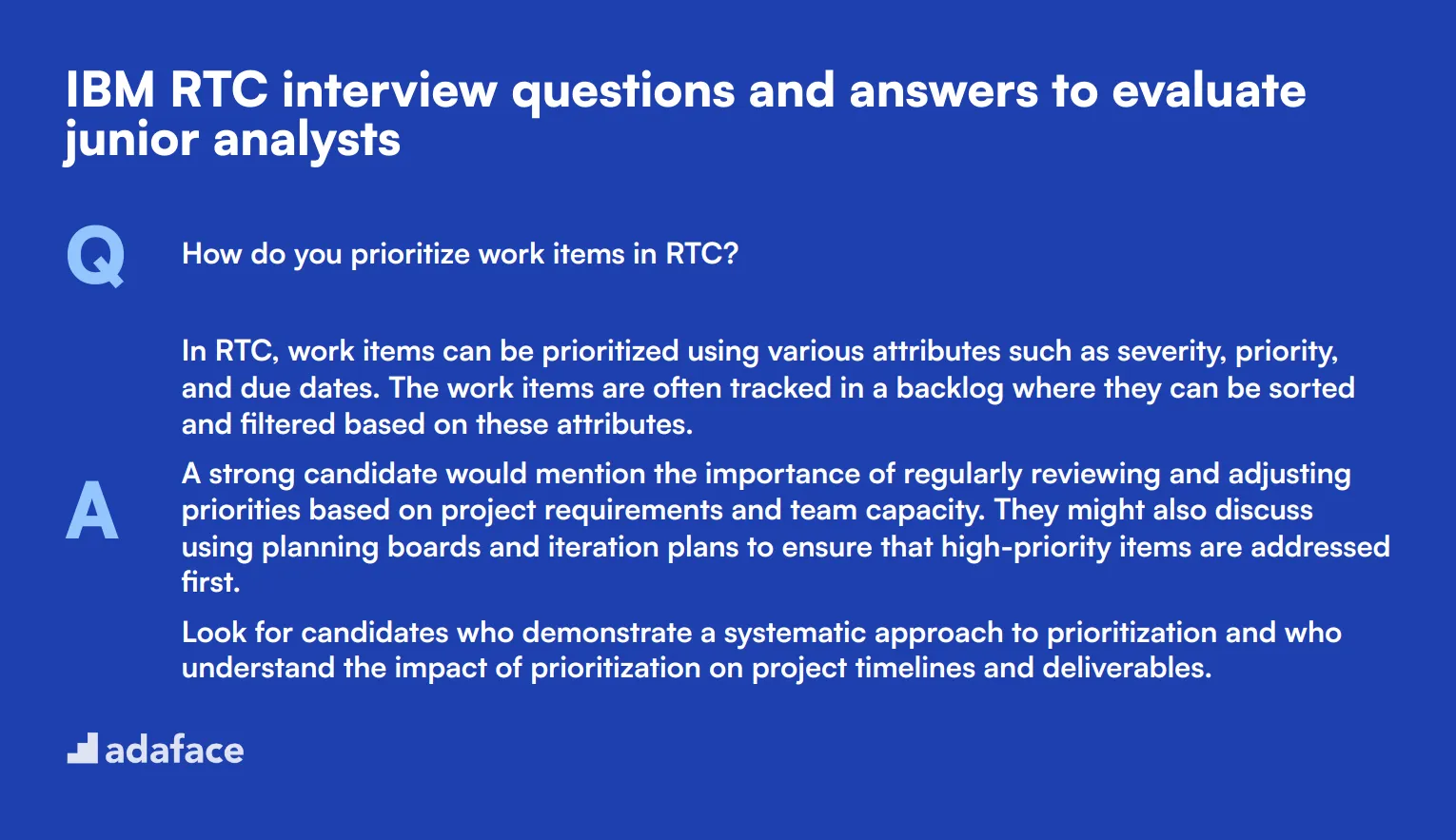
To evaluate whether junior analysts have the foundational knowledge and skills needed to successfully navigate IBM Rational Team Concert (RTC), ask them some of these practical interview questions. These questions will help you assess their understanding of key concepts and their ability to apply RTC in real-world scenarios.
1. How do you prioritize work items in RTC?
In RTC, work items can be prioritized using various attributes such as severity, priority, and due dates. The work items are often tracked in a backlog where they can be sorted and filtered based on these attributes.
A strong candidate would mention the importance of regularly reviewing and adjusting priorities based on project requirements and team capacity. They might also discuss using planning boards and iteration plans to ensure that high-priority items are addressed first.
Look for candidates who demonstrate a systematic approach to prioritization and who understand the impact of prioritization on project timelines and deliverables.
2. Can you describe how to use the RTC dashboard to monitor project progress?
The RTC dashboard provides a visual representation of project progress through widgets and reports. It can display information such as burndown charts, work item statistics, and build status. These elements help teams track progress and identify potential bottlenecks.
Candidates should mention customizing the dashboard to suit the needs of the team and project. They might discuss setting up specific widgets for daily stand-ups or milestone reviews.
Ideal candidates will show they know how to leverage the dashboard to keep stakeholders informed and ensure that projects stay on track.
3. Explain the role of 'roles and permissions' in RTC.
In RTC, roles and permissions are crucial for defining what actions users can perform within a project area. Different roles such as Developer, Scrum Master, or Project Manager have specific permissions associated with them.
Candidates should explain how to assign roles to team members based on their responsibilities and how to modify permissions to fit the needs of the project. They might also discuss the importance of maintaining security and data integrity through proper role management.
Look for candidates who understand the balance between granting necessary access and protecting sensitive information.
4. How would you handle a situation where multiple team members are working on the same component in RTC?
To handle concurrent work on the same component, RTC offers features like locking, merging, and change sets. Team members can lock files to prevent others from making changes, or they can work in parallel and merge their changes later.
Candidates should discuss the importance of communication and coordination among team members to avoid conflicts. They might also describe using RTC's merging tools to resolve conflicts when they arise.
Strong candidates will demonstrate an understanding of strategies to minimize disruptions and ensure smooth collaboration.
5. What steps would you take to resolve a build failure in RTC?
To resolve a build failure, the first step is to identify the root cause by reviewing the build logs and error messages. This helps pinpoint the issue, whether it's a code error, missing dependency, or configuration problem.
Candidates should mention collaborating with the team to fix the issue, re-running the build, and verifying that the problem has been resolved. They might also discuss the importance of documenting the resolution process for future reference.
Look for candidates who show a methodical approach to troubleshooting and who emphasize the importance of communication and documentation.
6. Describe how you would use RTC to facilitate a code review process.
RTC supports code reviews through work item linking and review requests. Team members can link work items to code changes and request reviews from their peers directly within the tool.
Candidates should explain how to set up review checkpoints, assign reviewers, and track the progress of the review process. They might also discuss using comments and annotations to provide feedback and ensure that all issues are addressed.
An ideal candidate will demonstrate an understanding of the importance of code reviews in maintaining code quality and fostering team collaboration.
7. How do you manage dependencies between work items in RTC?
Dependencies between work items can be managed using links and traceability features in RTC. You can create parent-child relationships, link related work items, and set dependency constraints to ensure that tasks are completed in the correct order.
Candidates should mention using these links to visualize dependencies in planning boards and reports. They might also discuss the importance of regularly reviewing and updating dependencies to reflect the current state of the project.
Look for candidates who understand the significance of managing dependencies to avoid delays and ensure smooth project execution.
8. What are some common challenges you might face when using RTC and how would you address them?
Common challenges when using RTC include handling large amounts of data, dealing with complex workflows, and ensuring smooth integration with other tools. Performance issues and user adoption can also be significant hurdles.
Candidates should discuss strategies like optimizing data storage, simplifying workflows, and providing training and support to team members. They might also mention using built-in tools and features to monitor performance and address issues proactively.
Strong candidates will demonstrate problem-solving skills and a proactive approach to overcoming challenges in RTC usage.
15 intermediate IBM RTC interview questions and answers to ask mid-tier analysts
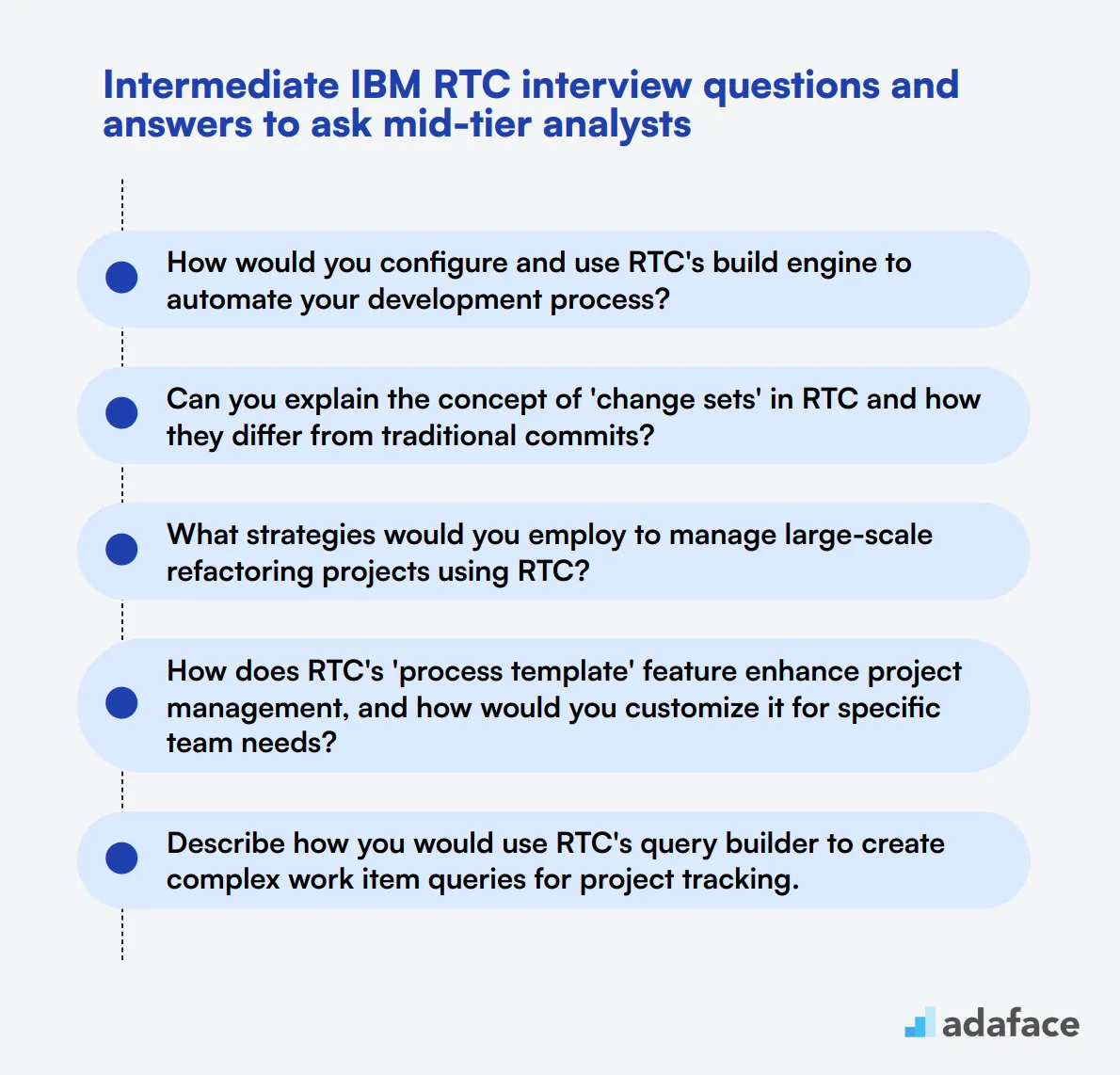
To assess the intermediate-level skills of software developers in IBM Rational Team Concert (RTC), use these 15 questions. They're designed to evaluate a candidate's practical knowledge and problem-solving abilities with RTC, helping you identify those who can effectively contribute to your team's collaboration and development processes.
- How would you configure and use RTC's build engine to automate your development process?
- Can you explain the concept of 'change sets' in RTC and how they differ from traditional commits?
- What strategies would you employ to manage large-scale refactoring projects using RTC?
- How does RTC's 'process template' feature enhance project management, and how would you customize it for specific team needs?
- Describe how you would use RTC's query builder to create complex work item queries for project tracking.
- What approach would you take to set up and manage component baselines in RTC?
- How does RTC's 'work item workflow' feature work, and how would you customize it for different project types?
- Can you explain the concept of 'suspend/resume' in RTC and when you might use it?
- How would you utilize RTC's 'plan' feature to manage and track project iterations?
- Describe the process of setting up and using 'personal builds' in RTC.
- How would you leverage RTC's SCM capabilities to manage multiple branches for feature development?
- Can you explain how to use RTC's 'compare' feature for effective code review and conflict resolution?
- What strategies would you employ to optimize RTC's performance for large distributed teams?
- How would you set up and use RTC's 'promotion' feature in a continuous integration/continuous deployment pipeline?
- Describe how you would use RTC's 'links' feature to establish traceability between work items, change sets, and builds.
7 IBM RTC interview questions and answers related to processes
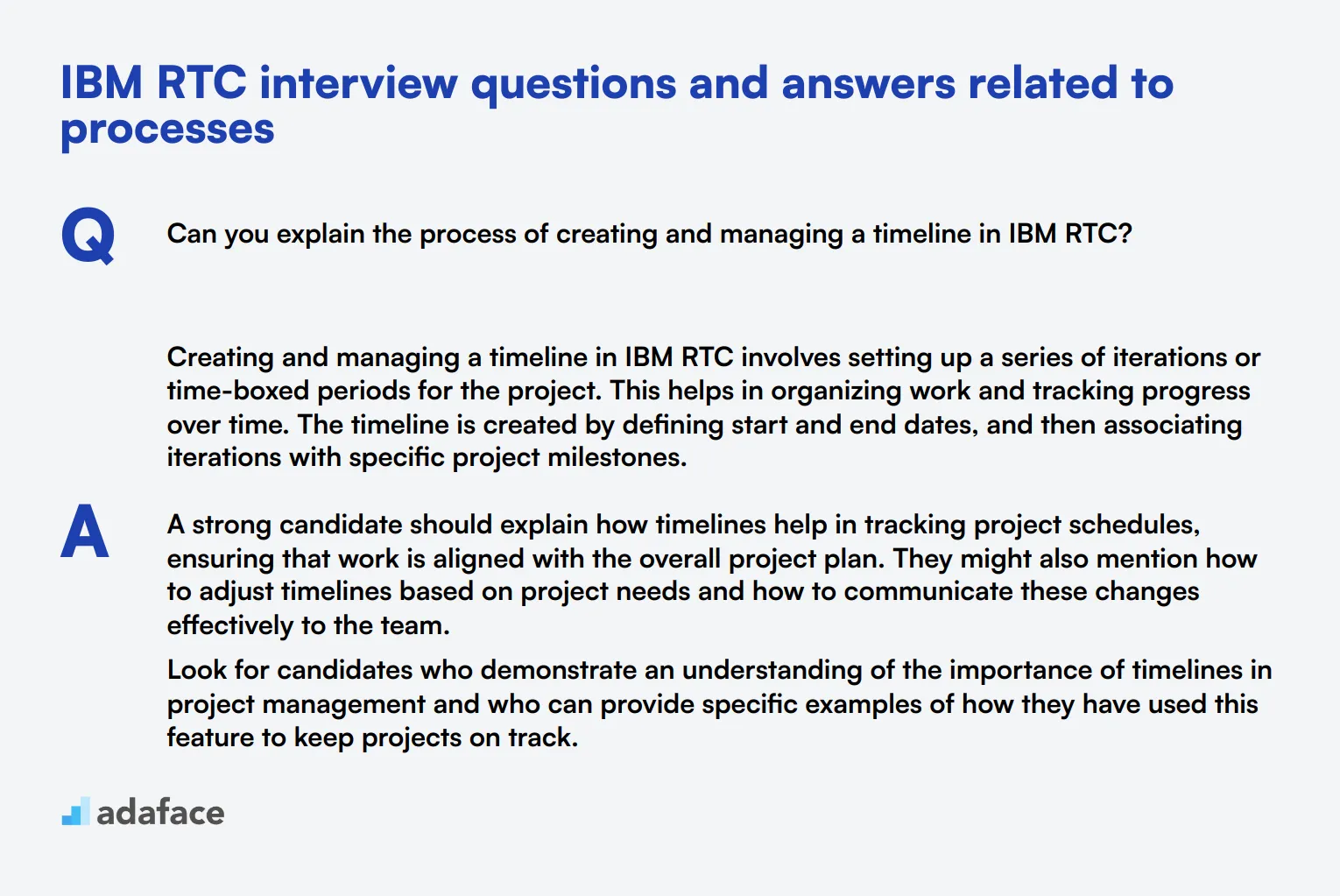
To gauge if your candidates can effectively navigate and utilize IBM RTC's process features, ask them some of these insightful interview questions. These questions are designed to help you assess their understanding and practical skills in process management within RTC.
1. Can you explain the process of creating and managing a timeline in IBM RTC?
Creating and managing a timeline in IBM RTC involves setting up a series of iterations or time-boxed periods for the project. This helps in organizing work and tracking progress over time. The timeline is created by defining start and end dates, and then associating iterations with specific project milestones.
A strong candidate should explain how timelines help in tracking project schedules, ensuring that work is aligned with the overall project plan. They might also mention how to adjust timelines based on project needs and how to communicate these changes effectively to the team.
Look for candidates who demonstrate an understanding of the importance of timelines in project management and who can provide specific examples of how they have used this feature to keep projects on track.
2. How would you customize a work item workflow in IBM RTC to fit a specific project requirement?
Customizing a work item workflow in IBM RTC involves configuring the states, actions, and rules that govern the lifecycle of a work item. This can be done through the RTC client by modifying the process configuration source, where you can add or remove states, define transitions, and set preconditions and follow-up actions.
The candidate should explain how they would identify the specific needs of the project and then customize the workflow to ensure it aligns with those requirements. They should also discuss how they would validate the workflow with stakeholders to ensure it meets their needs.
Ideal responses will show that the candidate can balance customization with usability, ensuring that the workflow is both functional and accessible to all team members.
3. What are some strategies you would use to manage team roles and permissions in IBM RTC?
Managing team roles and permissions in IBM RTC involves setting up different roles with specific access levels and permissions to ensure that team members can perform their tasks effectively. This can be done through the project area administration where you define roles and assign permissions to them.
Candidates should mention strategies such as regularly reviewing and updating roles to match team changes, ensuring that sensitive actions are restricted to authorized personnel, and using role-based access control to manage permissions.
Look for answers that emphasize the importance of maintaining security and efficiency, and that provide examples of how the candidate has effectively managed roles and permissions in previous projects.
4. How would you use IBM RTC's process template feature to enhance project management?
The process template feature in IBM RTC allows you to create reusable templates that define the process and practices for a project. These templates can include predefined work items, workflows, and timelines, which can be customized to fit the needs of a specific team or project.
Candidates should explain the benefits of using process templates, such as standardizing project management practices, reducing setup time for new projects, and ensuring consistency across different projects. They might also discuss how to customize templates to address unique project requirements.
An ideal candidate will demonstrate an understanding of how to leverage process templates to improve efficiency and consistency in project management. They should also be able to provide examples of how they have used this feature in past projects.
5. Describe how you would handle the integration of IBM RTC with other project management tools.
Integrating IBM RTC with other project management tools involves setting up connectors or using APIs to enable data exchange between RTC and the other tools. This ensures that information flows seamlessly across different systems, allowing teams to use the best tools for their specific tasks without losing data consistency.
Candidates should discuss the steps they would take to identify integration points, configure the connectors, and test the integration to ensure it works as expected. They might also mention the importance of maintaining documentation and training team members on how to use the integrated tools.
Look for candidates who have practical experience with tool integration and who can provide examples of successful integrations they have managed. They should also emphasize the importance of seamless data flow and user training.
6. What approach would you take to ensure effective communication and collaboration within a team using IBM RTC?
Effective communication and collaboration within a team using IBM RTC can be achieved by leveraging the platform's built-in features such as team dashboards, work item comments, and notification settings. Setting up regular meetings and using the RTC's planning and tracking tools also helps in keeping everyone aligned.
The candidate should explain how they would use RTC features to facilitate transparent communication, such as setting up team dashboards to provide a real-time view of project status, using work item comments for asynchronous communication, and configuring notifications to keep team members informed of important updates.
An ideal response should include examples of how the candidate has used these strategies in the past to enhance team collaboration and ensure that all team members are on the same page.
7. How would you track and manage project risks using IBM RTC?
Tracking and managing project risks in IBM RTC involves creating and maintaining work items specifically for risks. These work items can include details such as the nature of the risk, its impact, likelihood, and mitigation strategies. Using RTC's query and reporting features, you can regularly monitor and update the status of these risks.
Candidates should discuss how they would identify potential risks early in the project and create corresponding work items. They might also mention the use of risk matrices or other tools to prioritize risks based on their impact and likelihood.
Look for candidates who demonstrate a proactive approach to risk management and who can provide examples of how they have effectively tracked and mitigated risks in previous projects. They should also emphasize the importance of regular risk reviews and stakeholder communication.
10 IBM RTC questions related to tasks
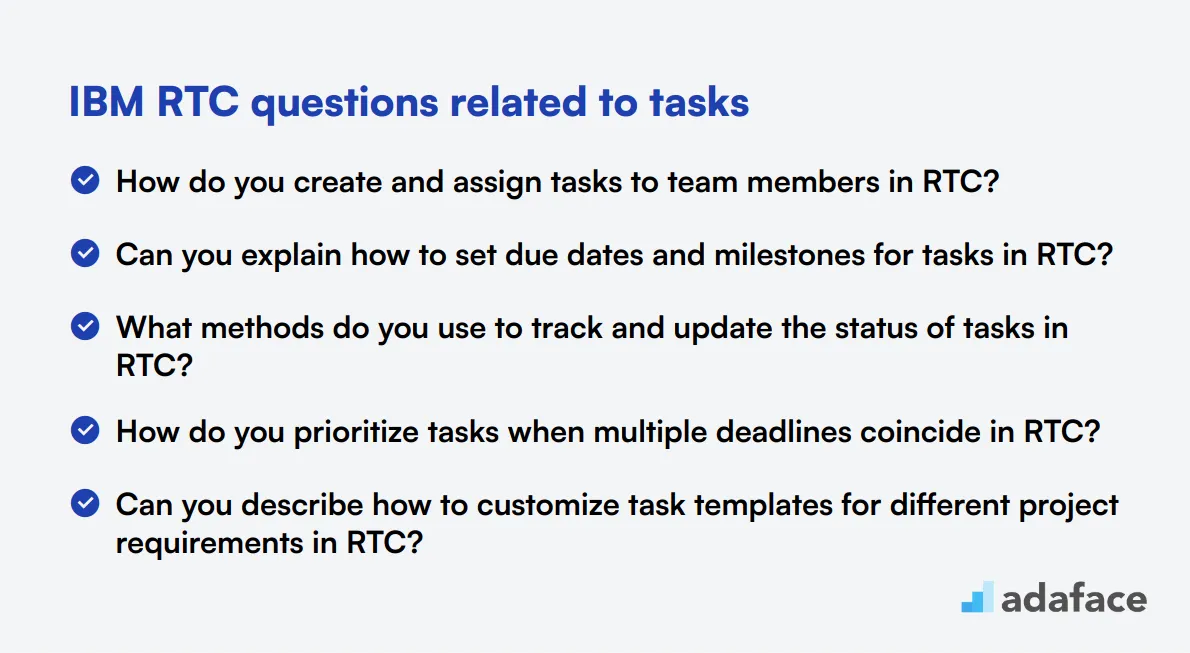
To evaluate candidates' practical knowledge of handling tasks in IBM RTC, consider using this list of targeted questions during interviews. They can help you assess the applicant's understanding of task management and their ability to navigate the software effectively, making sure you find the right fit for your team.
- How do you create and assign tasks to team members in RTC?
- Can you explain how to set due dates and milestones for tasks in RTC?
- What methods do you use to track and update the status of tasks in RTC?
- How do you prioritize tasks when multiple deadlines coincide in RTC?
- Can you describe how to customize task templates for different project requirements in RTC?
- What techniques would you use to ensure tasks are completed on time in RTC?
- How do you handle task dependencies and ensure alignment within the team in RTC?
- What strategies do you use for task estimation and workload balancing in RTC?
- How do you facilitate communication regarding task progress among team members in RTC?
- Can you explain how you would use RTC's notifications feature to keep team members informed about task updates?
Which IBM RTC skills should you evaluate during the interview phase?
While it's impossible to gauge every aspect of a candidate's capabilities in a single interview, focusing on key skills particularly relevant to IBM RTC can lead to a more effective assessment. Here are some significant skills you should evaluate during the interview phase to ensure candidates are well-equipped for roles involving IBM RTC.
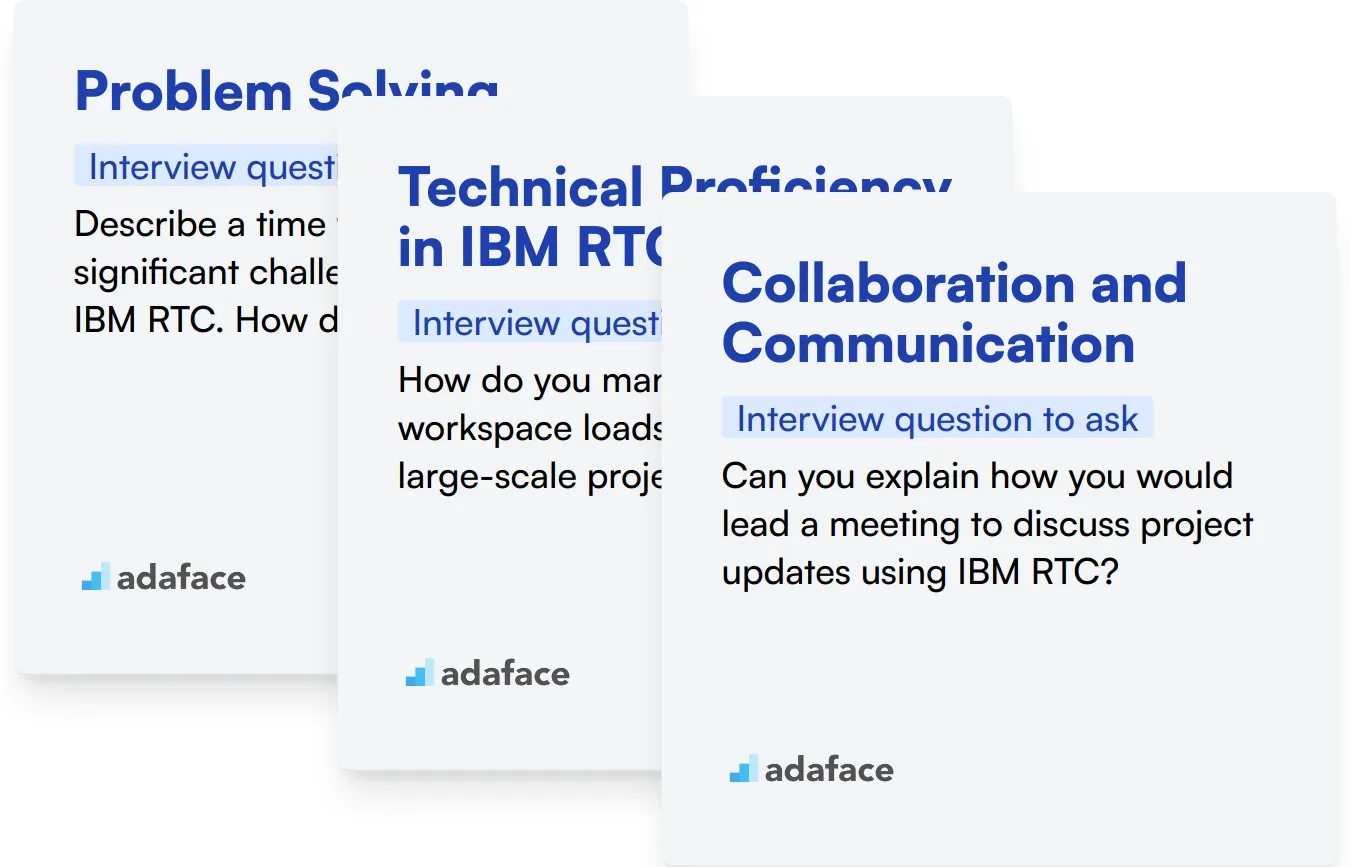
Problem Solving
Problem solving is critical for IBM RTC users as they must frequently address challenges in configuration management and workflow adjustments. The ability to identify, analyze, and address software issues directly correlates with effective use of IBM RTC tools.
Consider using a Problem Solving assessment to initially gauge this skill through relevant multiple-choice questions, making the early stages of recruitment more effective.
For a deeper understanding of their problem-solving skills, here is a targeted interview question:
Describe a time when you faced a significant challenge while using IBM RTC. How did you resolve it?
Look for detailed descriptions of the problem and the candidate's thought process. Effective answers should reveal a logical approach and knowledge application to IBM RTC specifics.
Technical Proficiency in IBM RTC
Technical proficiency in IBM RTC is essential as it ensures that the candidate can effectively navigate and utilize IBM's complex software suite for change and configuration management.
Assess their technical proficiency with this specific interview question:
How do you manage and optimize workspace loads in IBM RTC for a large-scale project?
Candidates should demonstrate an understanding of workspace management in IBM RTC, highlighting strategies to maintain efficiency and minimize system overload.
Collaboration and Communication
Effective collaboration and communication are integral for users of IBM RTC, facilitating smooth interactions and coordination among various stakeholders in software development projects.
To effectively screen for these capabilities, an assessment test in your early hiring stages could refine your candidate pool.
Evaluate their communication and collaboration skills further with this question:
Can you explain how you would lead a meeting to discuss project updates using IBM RTC?
The answer should showcase the candidate's ability to use IBM RTC as a collaborative tool while clearly communicating project status and tasks to team members.
Optimizing IBM RTC Interviews: Strategies for Success
As you prepare to implement the insights from this blog, here are essential tips to ensure you apply IBM RTC interview questions effectively to select the best candidates.
1. Incorporate Skills Tests Prior to Interviews
Before diving into the interview process, it's beneficial to use skill tests to gauge candidates' proficiency. This step helps in shortlisting the applicants who possess the required technical capabilities, saving time and effort during the following interview stages.
For roles involving IBM RTC, you can utilize assessments such as IBM DB2, IBM Websphere, or IBM BPM. These tests not only confirm the necessary technical skills but also ensure that candidates have a practical understanding relevant to the job.
Implementing these tests early in the recruitment process enhances the quality of your candidate pool and streamlines the subsequent interviewing phase, allowing for a more focused discussion on fit and potential within your organization.
2. Strategically Compile Interview Questions
Given the limited time available during an interview, selecting the right questions is key to effectively evaluate candidates on crucial technical and interpersonal skills.
In addition to IBM RTC-specific questions, consider incorporating queries from other relevant skill sets such as Java, SQL, or soft skills like communication and teamwork. These will give you a more rounded view of the candidate's abilities and suitability for your team.
The strategy of mixing technical and soft skill questions ensures a holistic assessment of each candidate, aligning their skills and cultural fit with your team's needs.
3. Master the Art of Follow-Up Questions
Merely running through a list of prepared questions might not give you the full picture of a candidate's capabilities or fit.
Consider this: if a candidate mentions experience with 'configuring RTC work items', a good follow-up would be, 'Can you describe a specific challenge you faced while configuring these items and how you resolved it?' This question reveals more about their problem-solving skills and depth of knowledge.
Harnessing IBM RTC Interview Questions & Skills Tests for Effective Hiring
When hiring for roles requiring IBM RTC proficiency, verifying a candidate's skills is key. The most direct method to assess these skills is through specialized skills tests. These tests are designed to measure not only knowledge but also the practical application of IBM RTC in real-world scenarios.
Using these tests allows you to streamline the candidate selection process by quickly identifying the most skilled applicants. For further evaluation, guide them through interviews armed with targeted questions. Begin by signing up on our platform to access our comprehensive assessment tools and improve your hiring accuracy.
IBM DB2 Database Online Test
Download IBM RTC interview questions template in multiple formats
IBM RTC Interview Questions FAQs
IBM Rational Team Concert (RTC) is a collaborative project management tool used for task tracking, source control, and agile planning.
These questions help interviewers assess candidates' technical skills, problem-solving abilities, and understanding of IBM RTC processes.
Yes, the questions are categorized for junior, intermediate, and experienced candidates, making it easier to tailor interviews to the candidate's level.
Key skills include understanding of RTC processes, task management, source control, and the ability to customize and troubleshoot projects.
While they are designed for analysts, many questions can be adapted for other roles that require knowledge of IBM RTC.
Provide them with resources related to IBM RTC, such as documentation, user guides, and practice tasks to familiarize themselves with the tool.

40 min skill tests.
No trick questions.
Accurate shortlisting.
We make it easy for you to find the best candidates in your pipeline with a 40 min skills test.
Try for freeRelated posts
Free resources




